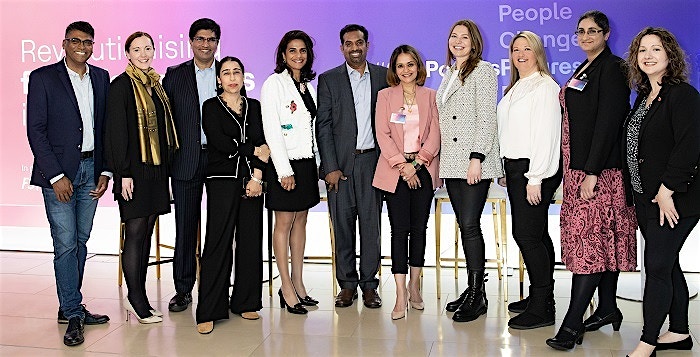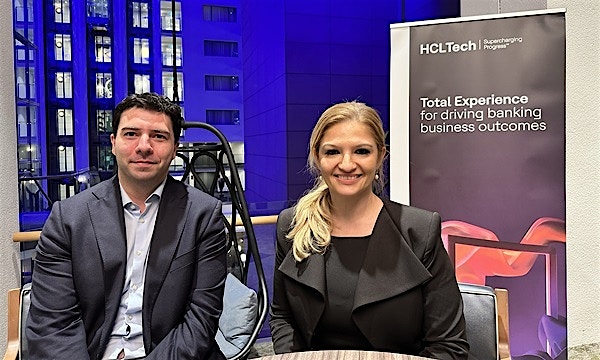Generative AI (GenAI) is a branch of artificial intelligence, falling under the umbrella of machine learning (ML) and sitting at the crossroads of deep learning (DL) and natural language processing (NLP).
At its center, the most talked about technology in the world is transforming the relationship between humans and algorithms.
“GenAI has managed to excite everyone, and the buzz is similar to the dotcom boom,” said Mani Nagasundaram, Senior Vice President, Head Strategic Initiatives and Cloud Ecosystems, Financial Services at HCLTech, during the AWS and HCLTech event in London.
He added: “Despite the dotcom crash, new businesses emerged after the dotcom boom. Some new businesses and industries will emerge in the world of GenAI.”
During the first keynote at Gartner’s IT Symposium, analysts Mary Mesaglio, Don Scheibenreif and Erick Brethenoux emphasized the monumental impact that GenAI will have across all industries:
- By 2025, generative AI will be a workforce partner for 90% of companies globally
- By 2030, 80% of humans will engage with smart robots daily
However, this impact is not yet defined, and organizations are unclear of where GenAI will take them. In addition, Gartner predicts that by 2028, more than 50% of enterprises that have built their large language models (LLMs) from scratch will abandon their efforts due to costs, complexity and technical debt.
The impact on financial services
Looking specifically at financial services, banks will apply GenAI in growth areas such as fraud detection, prediction and risk modeling, while more advanced forms of automatic systems such as robo-advisors will emerge.
During the panel, Helena Forest, Global Head of Solution Design, Client Service and Implementations, J.P. Morgan Payments, said: “AI and machine learning has been used for decades. But with GenAI, the speed of development is incredible. We’re experiencing something similar to the industrial revolution. The impact in financial services is still emerging, but early use cases focus on using internal and external knowledge to write and test code, automatic follow ups and actions from recorded meetings and deep learning around sentiment analysis to gauge the impact of things like earnings reports on employees and investors.”
Suman Rao, Managing Director for the UK and Ireland at Avaloq, added: “We operate in a heavily regulated environment and so the reaction to GenAI, at the moment, is caution. Not many private banking institutions are putting significant investment into GenAI strategy and implementation. Even if they are, they’re doing so with lower risk use cases.”
The data consideration
Like any AI model, GenAI models are data hungry, and the data needs to be ready.
“The training of AIs has to be underpinned by a robust strategy for data management. Financial services firms understand the importance of protecting customer data and maintaining trust in that – the most important principle that firms need to bear in mind is having clear guardrails about what’s being used, and how clean the metadata is,” said Kari-Anne Clayton, Head of Strategy, Transformation, Risk & Service – Retail CDIO, NatWest.
Rao added: “Organizations need to feed LLMs with a continuous supply of reliable, accurate and clean data. That is a huge task. You need to step back and take time to forge a stringent data strategy with a scalable tech platform — these are some of the pre-requisites before applying GenAI powered use cases.”
In this environment, data security, in a world of evolving cybersecurity threats, is fundamental for organization’s training GenAI models.
“Financial services firms must keep data secure every day of the week. When it comes to GenAI, hackers are improving their skills with the technology, but so are the organizations. Everyone has the same tools, and the industry is constantly evolving and upgrading to fight against the bad actors,” said Niamh Daly, SVP and International ICTO at State Street.
Risk and regulation
“To overcome risk concerns and other barriers, organizations need to get in early with their risk and control partners and CROs [chief risk officers] to create the controls that are going to be needed from a transparency point of view for AI,” said Clayton.
Despite the uncertainty and clear challenges, a Gartner survey revealed that nearly 70% of financial services leaders reported that generative AI tools have the potential for benefits rather than risks for their organization.
Clayton added that regulation is needed to protect the customer: “We’ll hopefully see a global convergence and ambition for a set of principles and standards that we can get behind as a unified world, with different data privacy laws by country.”
Appropriate AI regulations haven’t been written yet, which is why the world’s leading nations are trying to align. Forest advised that the “initial focus should be on the immediate risks, like deepfakes and data privacy, and the long-term risks, such as the existential threat to humanity.”
She continued: “No one can predict how far we can take these models. Is there a switch off button in case of an emergency? We need to take a balanced approach that incorporates fair competition and freedom of innovation, with safety.”
The new world
In this new world, GenAI is going to enable people to do their jobs in a different way. “It’s going to get rid of the mundane tasks on a mass scale and give time to focus on actions that are productive and beneficial,” said Daly.
She added: “And in this new environment it’s important that we continue to learn, because GenAI can learn quickly.”
At the same time, according to Rao, organizations are going to need to upskill the workforce: “Where these GenAI models are implemented, you need to upskill the workforce to oversee them and to make sure that what they’re producing is accurate and without biases. Oversight is critical.”
To address the problem of bias in this new, GenAI-driven world, Forest explained that “clean data is the path towards addressing biases.”
She noted: “But with things like ChatGPT, it swallowed the internet – the good and the bad, including biases. So, the question remains, how do we ensure that we go back to reliable sources with data that has been validated, especially for a generation that is increasingly turning to these tools?”
A collaborative approach
Financial services leaders, as deliberated on the panel, are strategically navigating the realm of GenAI, demonstrating a judicious approach in aligning with their organizational vision.
In collaboration with technology pioneers such as AWS, HCLTech is diligently supporting customers across diverse domains. Whether in the intricacies of MLOps framework, crafting robust data strategies, enhancing end-user experiences, optimizing developer productivity or streamlining back-office processes, HCLTech, in tandem with AWS, stands as a steadfast partner.
This collaborative synergy extends to a dedicated business unit, a joint initiative between HCLTech and AWS, operating in conjunction with globally dispersed cloud native GenAI labs. This collaboration harnesses the democratized capabilities of GenAI on the AWS platform, specifically tailored for the financial services industry. Addressing pertinent challenges voiced during the panel’s discussions, such as establishing secure environments detached from the Internet domain, discerning suitable models, and customizing training processes prior to the utilization of real data, this partnership emerges as a pivotal solution provider in the ever-evolving landscape of financial technology.
As Dilhani Palehepitiya, EMEA & APJ GSI Partner Success Leader for Global Financial Services at AWS emphasized during the event, the “power of three” — involving customers, systems integrators and technology vendors — facilitates rapid experimentation (POC) on various use cases. This collaborative approach empowers swift identification of tailored solutions within weeks, allowing customers to iterate and fail fast. Streamlining this process sharpens the focus exclusively on validated and essential use cases, significantly enhancing the time-to-value proposition. This strategic alliance, seamlessly integrated into HCLTech's partnership with AWS, exemplifies a commitment to agility and innovation, while delivering tangible results for financial services customers.
Revolutionizing financial services with GenAI
There is no doubt that GenAI will revolutionize financial services and a host of other industries, at a significant cost. However, the disruption on the horizon is not clear yet, with only a handful of early adopters experimenting with GenAI models at scale.
GenAI, and AI in general, will have a profound impact on how humans, machines and algorithms interact. The technology will revolutionize productivity and efficiency in everyday activities, while what Gartner calls game-changing AI will create new and disrupt existing business models.
Based on the insights from the panel, to be ready for GenAI, financial services firms need to:
- Create a GenAI roadmap with guiding principles on its use
- Establish a viable investment strategy
- Ensure that data is AI-ready, with appropriate risk controls, clean metadata and no bias
- Implement AI security protocols
- Contribute to and embrace regulation





